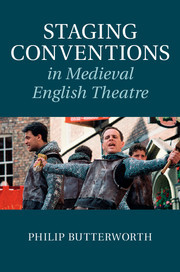Staging Conventions in Medieval English Theatre
Langue : Anglais
Auteur : Butterworth Philip

Examines staging conventions in the medieval English theatre and ways in which they conditioned the reactions of the audience.
How was medieval English theatre performed? Many of the modern theatrical concepts and terms used today to discuss the nature of medieval English theatre were never used in medieval times. Concepts and terms such as character, characterisation, truth and belief, costume, acting style, amateur, professional, stage directions, effects and special effects are all examples of post-medieval terms that have been applied to the English theatre. Little has been written about staging conventions in the performance of medieval English theatre and the identity and value of these conventions has often been overlooked. In this book, Philip Butterworth analyses dormant evidence of theatrical processes such as casting, doubling of parts, rehearsing, memorising, cueing, entering, exiting, playing, expounding, prompting, delivering effects, timing, hearing, seeing and responding. All these concerns point to a very different kind of theatre to the naturalistic theatre produced today.
Introduction; 1. Outdoors and indoors; 2. Casting and doubling; 3. Rehearsing, memorising and cueing; 4. Coming and going; 5. Playing, feigning and counterfeiting; 6. Dressing and disguising; 7. Expounding and monitoring; 8. Effecting effects; 9. Timing and waiting; 10. Hearing, seeing and responding.
Philip Butterworth is Visiting Research Fellow in the Institute for Medieval Studies at the University of Leeds. He was formerly Reader in Medieval Theatre and Dean for Research at the University of Leeds. In 2005 he took early retirement in order to concentrate on full-time research. His principal medieval publications are Theatre of Fire: Special Effects in Early English and Scottish Theatre (1998), Magic on the Early English Stage (Cambridge, 2005 and 2010, and winner of the David Bevington Prize, 2006) and The Narrator, the Expositor, and the Prompter in European Medieval Theatre (ed.) 2007. He also co-authored The Cambridge Introduction to Scenography (with Joslin McKinney, Cambridge, 2009). He was a founder member of the renowned Octagon Theatre, Bolton and taught in the Drama Department at Bretton Hall for many years.
Date de parution : 06-2014
Ouvrage de 283 p.
15.6x23.5 cm
Date de parution : 07-2018
Ouvrage de 284 p.
15.3x23 cm
Thème de Staging Conventions in Medieval English Theatre :
© 2024 LAVOISIER S.A.S.



